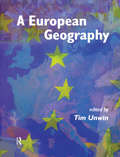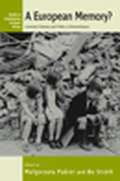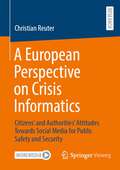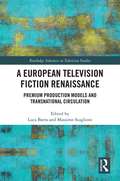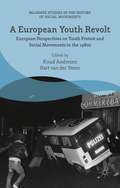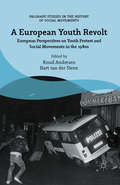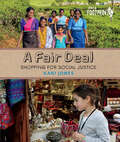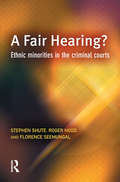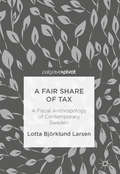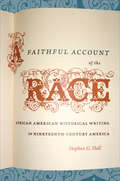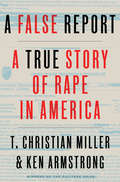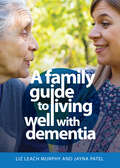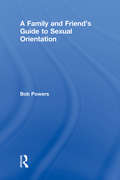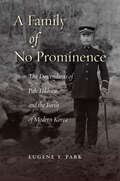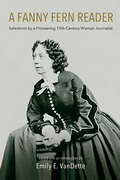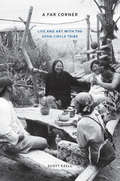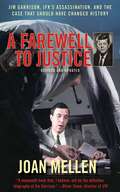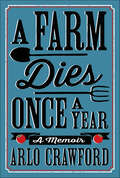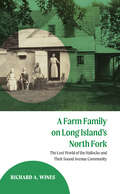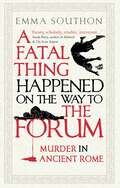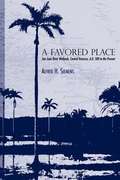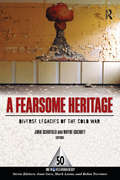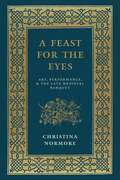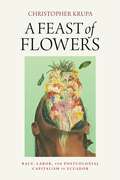- Table View
- List View
A European Geography
by Tim UnwinA European Geography provides a geographical interpretation and exposition of the whole of Europe. Beginning with a historical and envronmental introduction, the text covers the cultural identity, political structure, economic organisation and social context of Europe, examining the complex issues that are shaping the characteristics and meaning of contemporary Europe. More than fifty contributors are drawn from Europe and North America, contributing a wealth of research expertise in their specialist subject areas. Detailed case studies provide empirical examples of the broader research themes examined.A European Geography is written for undergraduate students taking courses on Europe, Regional Geography, European Studies, and European Integration. It will provide valuable reading for anyone interested in developing a detailed understanding of the processes shaping contemporary Europe.
A European Memory?
by Małgorzata Pakier Bo StråthAn examination of the role of history and memory is vital in order to better understand why the grand design of a United Europe--with a common foreign policy and market yet enough diversity to allow for cultural and social differences--was overwhelmingly turned down by its citizens. The authors argue that this rejection of the European constitution was to a certain extent a challenge to the current historical grounding used for further integration and further demonstrates the lack of understanding by European bureaucrats of the historical complexity and divisiveness of Europe's past. A critical European history is therefore urgently needed to confront and re-imagine Europe, not as a harmonious continent but as the outcome of violent and bloody conflicts, both within Europe as well as with its Others. As the authors show, these dark shadows of Europe's past must be integrated, and the fact that memories of Europe are contested must be accepted if any new attempts at a United Europe are to be successful.
A European Perspective on Crisis Informatics: Citizens’ and Authorities’ Attitudes Towards Social Media for Public Safety and Security
by Christian ReuterMobilising helpers in the event of a flood or letting friends know that you are okay in the event of a terrorist attack – more and more people are using social media in emergency, crisis or disaster situations. Storms, floods, attacks or pandemics (esp. COVID-19) show that citizens use social media to inform themselves or to coordinate. This book presents qualitative and quantitative studies on the attitudes of emergency services and citizens in Europe towards social media in emergencies. Across the individual sub-studies, almost 10,000 people are surveyed including representative studies in the Netherlands, Germany, the UK and Italy. The work empirically shows that social media is increasingly important for emergency services, both for prevention and during crises; that private use of social media is a driving force in shaping opinions for organisational use; and that citizens have high expectations towards authorities, especially monitoring social media is expected, and sometimes responses within one hour. Depending on the risk culture, the data show further differences, e.g. whether the state (Germany) or the individual (Netherlands) is seen as primarily responsible for coping with the situation.
A European Television Fiction Renaissance: Premium Production Models and Transnational Circulation (Routledge Advances in Television Studies)
by Luca Barra Massimo ScaglioniThis book maps the landscape of contemporary European premium television fiction, offering a detailed overview of both the changes in the digital production and distribution and the emergence of specific national and transnational case histories. Combining a media-production approach with a textual and audience analysis, the volume offers a complex, stratified, systemic view of ongoing aesthetic, sociocultural and industrial developments in contemporary European TV. With contributions from leading experts in the field, the book first offers an overview of the industrial, policy and cultural context for the renaissance of European television drama over the past decade, based on original comparative research. This research is then supported by case study chapters from the key contexts within which quality European television is being produced, offering a complex and complete picture of the industry’s strengths and limitations, its traditions and trends, its constraints and future perspectives. A European Television Fiction Renaissance is a must-read book for TV scholars working across Europe and beyond in the areas of media studies, international communications and television studies, media industries studies, production studies, European studies, and media policy studies as well as for those with an interest in television drama, Netflix, globalisation, pay TV and on demand.
A European Youth Revolt: European Perspectives on Youth Protest and Social Movements in the 1980s (Palgrave Studies in the History of Social Movements)
by Knud Andresen Bart van der SteenA European Youth Revolt.
A European Youth Revolt: European Perspectives on Youth Protest and Social Movements in the 1980s (Palgrave Studies in the History of Social Movements)
by Bart van der SteenDuring the early 1980s, large parts of Europe were swept with riots and youth revolts. Radicalised young people occupied buildings and clashed with the police in cities such as Zurich, Berlin and Amsterdam, while in Great Britain and France, 'migrant' youths protested fiercely against their underprivileged position and police brutality. Was there a link between the youth revolts in different European cities, and if so, how were they connected and how did they influence each other? These questions are central in this volume. This book covers case studies from countries in both Eastern and Western Europe and focuses not only on political movements such as squatting, but also on political subcultures such as punk, as well as the interaction between them. In doing so, it is the first historical collection with a transnational and interdisciplinary perspective on youth, youth revolts and social movements in the 1980s.
A Fair Deal: Shopping for Social Justice (Orca Footprints #11)
by Kari JonesKey Selling Points A Fair Deal was shortlisted for the Red Cedar Book Award and the OLA Silver Birch Award, Non-Fiction. Includes vibrant full-color photographs and informative sidebars. Now available for the first time in a paperback edition.
A Fair Hearing?
by Roger Hood Stephen Shute Florence SeemungalThis book reports on research which investigates the perceptions of ethnic minorities concerning their treatment in the criminal courts. It examines the extent to which ethnic minority defendants and witnesses in both the Crown Court and the magistrates' courts perceived their treatment to have been unfair, whether they believed any unfairness to have been the result of ethnic bias, and whether this had affected their confidence in the criminal courts. The study, carried out by the Oxford Centre for Criminological Research in association with the University of Birmingham for the Lord Chancellor's Department, involved observations of cases and interviews with more than a thousand people (defendants, witnesses, barristers, solicitors, judges, magistrates and others), and focused on courts in Manchester, Birmingham and London. A Fair Hearing? Ethnic minorities in the criminal courts begins by showing how widely held the belief has been that ethnic minorities are discriminated against by the courts and by other agencies in the criminal justice system. It discusses the factors that contributed to this belief, including the findings of the Macpherson Report and the notion of 'institutional racism'. The main part of the book then looks at the institutional setting in which the research took place, the experience of defendants and witnesses, their views about how they were treated by the criminal courts, and the views of others involved in the court process. Final chapters in the book address the issue of sensitivity to ethnicity on the part of judges, magistrates and lawyers. It shows that attitudes and practices are perceived to have changed for the better and examines what more needs to be done to increase the confidence that members of ethnic minorities have in the fairness of the criminal courts.
A Fair Share of Tax: A Fiscal Anthropology of Contemporary Sweden
by Lotta Björklund LarsenThis book is open access under a CC BY 4.0 license.This book takes a taxpayer's perspective on the relations taxation creates between people and their state. Björklund Larsen proposes that in order to understand tax compliance and cheating, we have to look beyond law, psychological experiments and surveys to also include tax collectors and taxpayers' practices. The text explores the view of taxes seen as citizen’s explicit economic relation to the state and implicit economic relation to all other compatriots. Björklund Larsen directs our gaze onto the concept of reciprocity, which is often proposed as an explanation in tax compliance research, and explores its diverse meanings and implications ethnographically. The empirical cases are based on ethnography from two opposing tax practices in Sweden. Firstly, from a study of analysts, auditors, legal experts and managers at the Swedish Tax Agency and how they, quite successfully, strive for legitimacy in their tax collecting activities. Secondly, from fieldwork among a group of middle-aged Swedes and how they justify their purchasing work off the books – essentially tax-cheating practices. Sweden is a modern welfare society with citizens holding rational and secular values, yet trusting their government and fellow citizens. Sweden also has a high tax burden that is collected by one of its most revered governmental agencies – the Swedish Tax Agency - making it an interesting case studying tax compliance.
A Faithful Account of The Race
by Stephen G. HallThe civil rights and black power movements expanded popular awareness of the history and culture of African Americans. But, as Stephen Hall observes, African American authors, intellectuals, ministers, and abolitionists had been writing the history of the black experience since the 1800s. With this book, Hall recaptures and reconstructs a rich but largely overlooked tradition of historical writing by African Americans. Hall charts the origins, meanings, methods, evolution, and maturation of African American historical writing from the period of the Early Republic to the twentieth-century professionalization of the larger field of historical study. He demonstrates how these works borrowed from and engaged with ideological and intellectual constructs from mainstream intellectual movements including the Enlightenment, Romanticism, Realism, and Modernism. Hall also explores the creation of discursive spaces that simultaneously reinforced and offered counternarratives to more mainstream historical discourse. He sheds fresh light on the influence of the African diaspora on the development of historical study. In so doing, he provides a holistic portrait of African American history informed by developments within and outside the African American community.
A False Report: A True Story of Rape in America
by T. Christian Miller Ken ArmstrongTwo Pulitzer Prize-winning journalists tell the riveting true story of Marie, a teenager who was charged with lying about having been raped, and the detectives who followed a winding path to arrive at the truth. <P><P>On August 11, 2008, eighteen-year-old Marie reported that a masked man broke into her apartment near Seattle, Washington, and raped her. Within days police and even those closest to Marie became suspicious of her story. The police swiftly pivoted and began investigating Marie. Confronted with inconsistencies in her story and the doubts of others, Marie broke down and said her story was a lie—a bid for attention. Police charged Marie with false reporting, and she was branded a liar. <P><P> More than two years later, Colorado detective Stacy Galbraith was assigned to investigate a case of sexual assault. Describing the crime to her husband that night, Galbraith learned that the case bore an eerie resemblance to a rape that had taken place months earlier in a nearby town. She joined forces with the detective on that case, Edna Hendershot, and the two soon discovered they were dealing with a serial rapist: a man who photographed his victims, threatening to release the images online, and whose calculated steps to erase all physical evidence suggested he might be a soldier or a cop. <P><P>Through meticulous police work the detectives would eventually connect the rapist to other attacks in Colorado—and beyond. <P><P>Based on investigative files and extensive interviews with the principals, A False Report is a serpentine tale of doubt, lies, and a hunt for justice, unveiling the disturbing truth of how sexual assault is investigated today—and the long history of skepticism toward rape victims.
A Family Guide to Living Well with Dementia
by Liz Leach Murphy Jayna PatelGain the knowledge and insight you need to support your loved one with dementia to live life as they wish. When a family member is diagnosed with dementia it’s difficult to know what to do. Do you worry you don’t have the skills and knowledge to support them? And what about looking after your own mental health?A Family Guide to Living Well with Dementia is here to help. Written by someone with lots of experience in this field, it gives you the knowledge and insight to be able to support the person with dementia to live life as they wish. This easy-to-follow and accessible guide contains information that is intended to support people to plan for how they want to live their life, receive their care, and for end-of-life planning.In this book you will find: Details of the different types of dementia and the dementia journey Explanations of the various Person Centred approaches to dementia care Information about people's rights within the health and social care legislation Insights into behaviour and methods of communication Support options available to you and your loved one, paid and community-based. Often people who have been diagnosed with dementia and their families report feeling lost and not sure what to do apart from learning to adapt and find a way to do their best in what can often be difficult circumstances. This book provides easy, engaging, and practical content for things to consider and conversations to have so as to be able to provide the best care and support on a basis of sound understanding from everyone involved.
A Family and Friend's Guide to Sexual Orientation: Bridging the Divide Between Gay and Straight
by Bob Powers Alan EllisA Family and Friend's Guide to Sexual Orientation helps individuals and families to bridge the divide between gay and straight, to heal wounds that often accompany individuals and families' negative feelings about lesbians, gay men, bisexuals, and transgendered persons. Consisting of thirty stories by individuals who have come to accept and embrace their own sexuality, twelve of the stories are by heterosexuals who, in addition to talking about their own sexuality, speak of the homosexuality of a loved one. The book also includes five personal stories from two families.
A Family of No Prominence: The Descendants of Pak Tokhwa and the Birth of Modern Korea
by Eugene ParkKoreans are known for their keen interest in genealogy and inherited ancestral status. Yet today's ordinary Korean would be hard pressed to explain the whereabouts of ancestors before the twentieth century. With A Family of No Prominence, Eugene Y. Park gives us a remarkable account of a nonelite family, that of Pak Tokhwa and his descendants (which includes the author). Spanning the early modern and modern eras over three centuries (1590–1945), this narrative of one family of the chungin class of people is a landmark achievement. What we do know of the chungin, or "middle people," of Korea largely comes from profiles of wealthy, influential men, frequently cited as collaborators with Japanese imperialists, who went on to constitute the post-1945 South Korean elite. This book highlights many rank-and-file chungin who, despite being better educated than most Koreans, struggled to survive. We follow Pak Tokhwa's descendants as they make inroads into politics, business, and culture. Yet many members' refusal to link their family histories and surnames to royal forebears, as most other Koreans did, sets them apart, and facilitates for readers a meaningful discussion of identity, modernity, colonialism, memory, and historical agency.
A Fanny Fern Reader: Selections by a Pioneering Nineteenth-Century Woman Journalist
by Fanny FernIn the middle of the nineteenth century, the highest paid and most famous newspaper writer in the US was a woman known to the world as Fanny Fern, the nom de plume of Sara Payson Willis. A Fanny Fern Reader features a selection of Fern's columns, mostly from her years as a weekly columnist for the New York Ledger, along with an introduction that shares the remarkable story of Fern's perseverance and success as a woman in a male-dominated profession. For readers in her own time, Fern's frank and unbridled social commentary and boldly satirical voice made her a household name. Fern's subversive and witty commentary about social mores, gender roles, childhood, authorship, and family life transcend time and continue to resonate with and entertain readers today. A Fanny Fern Reader is the most extensive collection of Fern's newspaper writings to date and includes several works that have been out of print for over a century, making this author's writing on a wide range of issues accessible for readers within and outside of classrooms and academic settings.
A Far Corner: Life and Art with the Open Circle Tribe
by Scott EzellIn 2002, after living ten years in Asia, American poet and musician Scott Ezell used his advance from a local record company to move to Dulan, on Taiwan’s remote Pacific coast. He fell in with the Open Circle Tribe, a loose confederation of aboriginal woodcarvers, painters, and musicians who lived on the beach and cultivated a living connection with their indigenous heritage. Most members of the Open Circle Tribe belong to the Amis tribe, which is descended from Austronesian peoples that migrated from China thousands of years ago. As a “nonstate” people navigating the fraught politics of contemporary Taiwan, the Amis of the Open Circle Tribe exhibit, for Ezell, the best characteristics of life at the margins, striving to create art and to live autonomous, unorthodox lives. In Dulan, Ezell joined song circles and was invited on an extended hunting expedition; he weathered typhoons, had love affairs, and lost close friends. In A Far Corner Ezell draws on these experiences to explore issues on a more global scale, including the multiethnic nature of modern society, the geopolitical relationship between the United States, Taiwan, and China, and the impact of environmental degradation on indigenous populations. The result is a beautifully crafted and personal evocation of a sophisticated culture that is almost entirely unknown to Western readers.
A Farewell to Justice: Jim Garrison, JFK's Assassination, and the Case that Should Have Changed History
by Joan MellenWorking with thousands of previously unreleased documents and drawing on more than one thousand interviews, with many witnesses speaking out for the first time, Joan Mellen revisits the investigation of New Orleans district attorney Jim Garrison, the only public official to have indicted, in 1969, a suspect in President John F. Kennedy's murder.Garrison began by exposing the contradictions in the Warren Report, which concluded that Lee Harvey Oswald was an unstable pro-Castro Marxist who acted alone in killing Kennedy. A Farewell to Justice reveals that Oswald, no Marxist, was in fact working with both the FBI and the CIA, as well as with US Customs, and that the attempts to sabotage Garrison's investigation reached the highest levels of the US government. Garrison's suspects included CIA-sponsored soldiers of fortune enlisted in assassination attempts against Fidel Castro, an anti-Castro Cuban asset, and a young runner for the conspirators, interviewed here for the first time by the author.Building upon Garrison's effort, Mellen uncovers decisive new evidence and clearly establishes the intelligence agencies' roles in both a president's assassination and its cover-up. In this revised edition, to be published in time for the fiftieth anniversary of the president's assassination, the author reveals new sources and recently uncovered documents confirming in greater detail just how involved the CIA was in the events of November 22, 1963. More than one hundred new pages add critical evidence and information into one of the most significant events in human history.
A Farm Dies Once a Year: A Memoir
by Arlo CrawfordA Book of the Month for GQ, The New Yorker, and Flavorwire"Beautifully told…In this one season of life, Crawford's writing about the work, people, nature and his family legacy reveals much about a simple life, and reminds us all to appreciate life's riches."—Seattle Post Intelligencer"A must-read…"—Washington Independent Review of BooksAn intimate, gorgeously observed memoir about family and farming that forms a powerful lesson in the hard-earned risks that make life worth livingThe summer he was thirty-one, Arlo Crawford returned home for the summer harvest at New Morning Farm—seventy-five acres tucked in a hollow in south-central Pennsylvania where his parents had been growing organic vegetables for almost forty years.Like many summers before, Arlo returned to the family farm's familiar rhythms—rise, eat, bend, pick, sort, sweat, sleep. But this time he was also there to change his direction, like his father years ago. In the 1970s, well before the explosion of the farm-to-table and slow food movement, Arlo's father, Jim, left behind law school and Vietnam, and decided to give farming a try. Arlo's return also prompts a reexamination of a past tragedy: the murder of a neighboring farmer twenty years before. A chronicle of one full season on a farm, with all its small triumphs and inevitable setbacks, A Farm Dies Once a Year is a meditation on work—the true nature of it, and on taking pride in it—and a son's reckoning with a father's legacy. Above all, it is a striking portrait of how one man builds, sows, and harvests his way into a new understanding of the risks necessary to a life well-lived.
A Farm Family on Long Island's North Fork: The Lost World of the Hallocks and Their Sound Avenue Community
by Richard A. WinesIn A Farm Family on Long Island's North Fork, Richard A. Wines traces the history of a vital agricultural community on the North Fork of Long Island through the story of the last family to live in the old Homestead at the Hallockville Museum Farm. For well over two centuries, community members were almost all descendants of the same group of seventeenth-century Puritan founders. Yet, despite their shared heritage and complex interrelationships, cultural wars raged. Family members and the community divided bitterly on issue after issue, ranging from whether to allow a melodeon into the church to supporting abolitionism. The community weathered many changes—the Civil War, the emergence of new agricultural technologies, the arrival of Eastern European immigrants, even an attempt to build a string of nuclear power plants in the twentieth century. Wines's deep dives into one community's history uncover stories about slavery, racism, and prejudice that many have chosen to forget, as well as stories of compassion or human tragedy we want to remember. A Farm Family on Long Island's North Fork will appeal to those interested in Long Island regional history and the larger history of rural communities throughout New York and the United States.
A Fatal Thing Happened on the Way to the Forum: Murder in Ancient Rome
by Emma SouthonIn Ancient Rome all the best stories have one thing in common – murder. Romulus killed Remus to found the city; Caesar was assassinated to save the Republic. Caligula was butchered in the theatre, Claudius was poisoned at dinner and Galba was beheaded in the forum. In one fifty-year period, twenty-six emperors were murdered. But what did killing mean in a city where gladiators fought to the death to sate a crowd? Emma Southon examines real-life homicides from Roman history to explore how perpetrator, victim and the act itself were regarded by ordinary people. Inside Ancient Rome&’s unique culture of crime and punishment, we see how the Romans viewed life, death, and what it means to be human.
A Favored Place: San Juan River Wetlands, Central Veracruz, A.D. 500 to the Present
by Alfred H. SiemensI doubt there is a wetland environment anywhere in the Americas inhabited, used, and modified as long as San Juan Basin, and by as many cultures with different technologies. This story needs to be told. --William E. Doolittle, Professor of Geography, University of Texas at Austin The wetlands of the San Juan Basin in Central Veracruz, Mexico, have been a favored place since the fifth century A. D. , when Prehispanic people built an extensive network of canals and raised fields that allowed for almost year-round agriculture. Alfred Siemens' discovery of the remains of this network in the 1970s led him to uncover fifteen centuries of land-use history in the region. This book contains a full record of his findings. Siemens organizes his history of the San Juan Basin around the question: What relationships exist between Prehispanic agriculture and the production systems of the tropical lowlands in our own time? This focus allows him to chart the changes in human perceptions and uses of the landscape, from the Prehispanic wetland agricultural system to the drained pastures of today's cattle ranches. Amplified with air oblique photography, maps, and tables, and enriched with data from archaeology and colonial archives, this is an authoritative historical geography of a wetland landscape. Or, in the author's more modest words, It seems to me that what I have here is a biography of a swamp.
A Fearsome Heritage: Diverse Legacies of the Cold War (One World Archaeology Ser. #50)
by John Schofield Wayne CocroftFrom massive nuclear test sites to the more subtle material realities of everyday life, the influence of the Cold War on modern culture has been profound and global. Fearsome Legacies unites innovative work on the interpretation and management of Cold War heritage from fields including archaeology, history, art and architecture, and cultural studies. Contributors understand material culture in its broadest sense, examining objects in outer space, domestic space, landscapes, and artistic spaces. They tackle interpretive challenges and controversies, including in museum exhibits, heritage sites, archaeological sites, and other historic and public venues. With over 150 color photos and illustrations, including a photographic essay, readers can feel the profound visual impact of this material culture.
A Feast for the Eyes: Art, Performance, and the Late Medieval Banquet
by Christina NormoreTo read accounts of late medieval banquets is to enter a fantastical world where live lions guard nude statues, gilded stags burst into song, and musicians play from within pies. We can almost hear the clock sound from within a glass castle, taste the fire-breathing roast boar, and smell the rose water cascading in a miniature fountain. Such vivid works of art and performance required collaboration among artists in many fields, as well as the participation of the audience. "A Feast for the Eyes"is the first book-length study of the court banquets of northwestern Europe in the fourteenth and fifteenth centuries. Christina Normore draws on an array of artworks, archival documents, chroniclers accounts, and cookbooks to re-create these events and reassess the late medieval visual culture in which banquets were staged. Feast participants, she shows, developed sophisticated ways of appreciating artistic skill and attending to their own processes of perception, thereby forging a court culture that delighted in the exercise of fine aesthetic judgment. Challenging modern assumptions about the nature of artistic production and reception, "A Feast for the Eyes"yields fresh insight into the long history of multimedia work and the complex relationships between spectacle and spectators. "
A Feast of Flowers: Race, Labor, and Postcolonial Capitalism in Ecuador
by Christopher KrupaWhen Ecuador's cut-flower industry took off in the mid-1980s, it rode a wave of international credit peddling and currency speculation that would lead countries of the Global South into successive debt crises and northern financial firms to fortune and dominion. By the start of the twenty-first century, as the Ecuadorian economy collapsed and its ties with international finance became strained, flower exporters rebuilt their businesses around the profitability of their indigenous labor force, drawing local communities deeply into new plantation systems taking over the highlands.In A Feast of Flowers, Christopher Krupa goes inside Ecuador's booming cut-flower industry to chronicle the ways its capitalist pioneers built a booming export industry around a racial ideology, turning indigenous people's purported differences into resources for industrial expansion. At the core of this racial system is a belief, central to postcolonial science and politics in Ecuador, in capitalism's unique capacity to change people's racial identity and to liberate oppressed populations from racial subordination. Krupa shows how such views not only guide how indigenous people are today incorporated into demanding labor systems in Ecuador's new export plantations, but also how indigenous minds and bodies became sites of study and intervention by scientists, politicians, and economic planners throughout the last century, all looking to change indigenous people in some way.Combining nearly two decades of ethnographic and historical research, A Feast of Flowers shows how aggressive capitalist expansion in postcolonial contexts may revive longstanding intersections between race and economy to facilitate new modes of dispossession under the guise of humanitarian intervention.
A Feeling for the Organism: The Life and Work of Barbara McClintock
by Evelyn F. Keller W. H. FreemanBiography of the scientist, written in 1983 before she was awarded the Nobel Prize.
